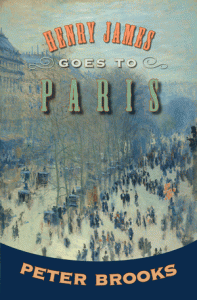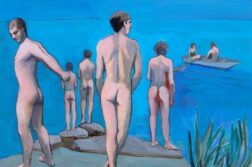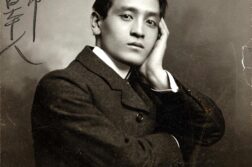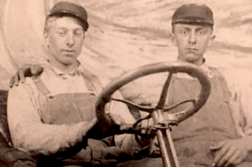 Henry James Goes to Paris
Henry James Goes to Paris
by Peter Brooks
Princeton University Press
255 pages, $24.95
THE CITY we most associate with Henry James is London, but when, at the age of 32, James left his family in Cambridge, Massachusetts, he moved to Paris. It wasn’t just that James was fluent in French. Paris was where the serious novelists were. One of his literary heroes, Ivan Turgenev, was living there. Turgenev introduced James to Flaubert, and Flaubert introduced James to Zola, Maupassant, Daudet, and the Goncourt brothers. The thesis of Henry James Goes to Paris is that, while James resisted many of the things these French writers were doing in l875, a few decades later much of what James had resisted bore fruit in his own writing.
What did James resist (besides the new form of painting we call Impressionism)? Well, for starters, one of the things Paris stood for in the Anglo-Saxon mind: sex. James fans have always wondered who it was that caused Henry to recall standing beneath someone’s windows in tears. In letters home that year in Paris, Peter Brooks tell us in his new biography, the person James described with the greatest affection was Pavel Zhukovsky, a cultured Russian émigré who ended up designing sets for Richard Wagner. We do not know what occurred between them, but when James went to visit the Russian in Italy a few years later, he found him living with a boyfriend and did not linger. The implication is that James was clearly exposed to a more sensuous way of life than Cambridge afforded, but kept his distance—which may have been one reason why he decided after a year that Paris was not where he belonged, and moved to London. Impressionism was not the only thing in Paris on which James looked askance. Brooks’ absorbing book is more proof that the very New England Puritanism that served as subject in his fiction seems to have inhibited James in his own life. After moving to London, he became the man French writers looked up when visiting England. One story, told by Oscar Wilde, has Maupassant asking James to chat up the women he found attractive at nearby tables in a restaurant, and James refusing. James would later lament that the English novel seemed written for women and children, but to his view Maupassant over-emphasized the carnal in both literature and life. 
As for art: James also kept aloof from what Flaubert, Maupassant, and friends were doing with the novel. Although Flaubert and colleagues had, naturally, moved beyond the writer James most admired, Honoré de Balzac, James felt they had taken a wrong turn. “What it comes back to is the intensity with which we live,” James wrote of the author of The Human Comedy (whom Flaubert also revered, once following him down the street, too shy to introduce himself), “and his intensity is recorded for us on every page of his work.” Even if Balzac was sometimes over the top—Bal-zac’s aristocratic women “really seem,” James wrote in an 1875 essay, “to be the creatures of the dreams of an ambitious hairdresser”—he tolerated the melodrama and theatricality because of the love-of-life instinct on every page. One even suspects that James liked theatricality; at least he claimed the “scenic method” was the key to his own writing. (Think of James’ plots: secrets from the past, fortune hunters, doomed heir-esses, revelations in great country houses, entrances and exits.) Bal-zac’s heightening of reality was for James a strength. “Balzac’s glory,” James wrote, “is that he pretended hardest.”
Yet, though he pretended, there was something else in Balzac that James admired to the detriment of Flaubert and his confreres. Balzac’s characters, James argued, despite the occasional false notes, exist independently of their creator. Flaubert’s do not. James admired Madame Bovary, but felt her to be under the thumb of her creator. The realism of Flaubert and Zola and Maupassant (whose story-telling gift James found supreme) was skewed by their views of life: Flaubert’s obsession with banality, Maupassant’s with sex, Zola’s with social justice. The criterion by which James judged fiction was “a sense of felt life.” When Zola told James he planned to write a novel about Rome after spending only a day there, James was incredulous. James felt one must be immersed in a subject before one can put it to paper. In other words, the French novelists he met were beginning to treat the novel too intellectually.
Even so, James wrote William Dean Howells, “They do the only kind of work today that I respect, and in spite of their ferocious pessimism and their handling of unclean things, they are at least serious and honest.” “Unclean things” says it all, the reader feels. Yet it was really the “ferocious pessimism” over which he parted with his hosts; the pessimism that led Flaubert to manipulate Emma Bovary, and led, in James’ view, to “a kind of artistic impoverishment or even totalitarianism,” as Brooks puts it, “that reveals a lack of respect for life, and for the capacities of fiction to represent life.” In other words, one could be considered a realist and not respect reality at all.
The way in which these men were realists, of course, differs. Flaubert veered between writing about contemporary life as a bleak and pointless wasteland, and novels set in ancient times that celebrated their orgiastic exoticism. But he died while working on an unfinished book, Bouvard et Pecuchet, which was to be a scathing attack on the modern audience, a compendium of all the books Flaubert had read on dozens of mundane subjects: an effort to compose a novel whose banalities would so disorient the reader that one would not know whether one was being made fun of or not; in other words, a satire on the public, and the materialism in which all of us are steeped. If Emma Bovary was still a tragic, or romantic, heroine, Bouvard and Pecuchet are merely buffoons—“Flaubert’s nerds,” Brooks calls them. By the end of his life Flaubert’s disgust with modern life had become intense. It was not only to make money (to help his financially strapped niece) that he wrote the three tales which include the famous “A Simple Heart”; it was also to show that he could write of people without irony.
James never had this problem. Life did not disgust him—though people’s conduct might. One is tempted to say the difference between James and Flaubert reflects the difference between a homosexual and a heterosexual—James, who claimed the raising of a woman’s eyebrow across the dinner table was more dramatic to him than the fall of Rome, versus Flaubert, who took immense pains to describe an agricultural fair so boring that one wanted to kill oneself. But that would sound reductive. Yet while both of these writers are considered realists, their styles are very different. Flaubert begins almost every paragraph of Madame Bovary with a precise notation of the weather and landscape; he takes pains to describe the fly crawling around the rim of a wineglass. James uses such general descriptive terms—his reference, in The Ambassadors, to “a small domestic item” as the product that Chad Newsome’s family manufactures in New England is only the most quoted example—that one ends up asking in what way James is a realist. (A doctor who treated James in New York in later life for depression after his brother’s funeral saw in him “a singular capacity for detachment from reality … and a dread of ugliness in all forms.”) The answer, I suppose, lies in his portrayal of human psychology, and social drama—though a teacher of mine, unaware, I think, of the double entendre, once claimed that all of James’ books are fairy tales.
Brooks offers a more fundamental reason for the argument James had with Flaubert: James’ rejection of Flaubert “seems motivated by an alarmed perception that Flaubertian practice would deconstruct James’s own writing.” Bouvard et Pecuchet would have threatened what James felt was “the commitment and project of the novel itself, as representation, as cognitive instrument in the study of life.” In other words, Flaubert at the end was attacking the role of fiction, while James was devoted to its power.
It’s remarkable how devoted he was—telling a despairing Henry Adams toward the end of their lives that it was James’ interest in his own artistic consciousness that kept him going—steadily writing even after the failure of the New York edition (a republication of his books that sold very poorly). We think of Flaubert as the anchorite of modern writers, but it was James who went on even longer, monastically devoted to his art (“Art makes interest, makes life”). We assume James’ last novel was The Golden Bowl—but in fact he went on after that to novelize an old play he had written (The Out Cry), which sold well, and was working on another big novel, The Ivory Tower (set, ironically, in the United States), which was recently published with a foreword by Alan Hollinghurst and the notes James had made for its completion. At the end of his life, James was as enthralled with constructing a novel as a child with a Lego set. Writing, he confessed to a younger man, was a response to his “essential loneliness.”
Indeed, the prose in The Golden Bowl is at times so convoluted that it seems like a man talking to himself—as if the minute he ceased producing the gorgeous stream of words, his isolation would become apparent, and his whole world would collapse (as it did with World War I). In fact, James was talking to himself: he dictated his last novels (though no one has addressed the question of what James actually sounded like. Had his voice acquired a British accent after all those years, did he speak like a Bostonian, a New Yorker, or a transatlantic man?). The point is that, despite the style that leads even Fanny Assingham to ask the Prince, “What on earth are you talking about?” in the second chapter of The Golden Bowl, and critics to declare the book unreadable, James never stopped pretending, never questioned the novel’s capacity to represent reality as he felt the French modernists had, even in 1875—a feeling borne out, one could argue, after James died, by the evolution of the French novel (Bouvard et Pecuchet, in a way, leads inevitably to the nouveau roman).
The one French novelist who fused the traditional and the modern was, ironically, another writer now thought to have been homosexual, Proust—but while we know Edith Wharton (the ultimate Francophile) gave James a copy of Swann’s Way, we do not—oh, so tantalizingly—know what James thought of it. But James had become modern in his own way, while still employing the old scenic method: women in big hats, gigolos, adulterers, in country houses.
And toward the end, Brooks argues, he accepted what he had rejected in 1875 both personally and artistically. The ferocious pessimism of the French writers to which he objected in 1875 can be seen in what the Prince tells Maggie in The Golden Bowl: “Everything’s terrible, cara—in the heart of man.” The plot of this novel—and the other two that make up the Major Phase—revolves around sex. In real life James had fallen for the sculptor Hendrik Andersen, and was basking in the attention of several young male admirers. Brooks also draws an analogy between the various points of view in The Golden Bowl and Impressionism—though if James had become modern in his depiction of the way we struggle to know (what Flaubert was mocking in Bouvard et Pecuchet), he also remained true to his original idol. Indeed, that’s why James toured the U.S. as late as 1905 with a lecture called “The Lesson of Balzac”—inaudibly, according to some of the women who flocked to hear him. (Think of Hermione Gingold, spitting out “BAL-zac!” in The Music Man as if it were a dirty word.) Though Flaubert, when he died, was working on something weirdly postmodern, James was trying to “recover,” in his lecture, “the novel’s wasted heritage.”
This should not be a surprise, since James spans two centuries. Henry James knew both Emerson and Edith Wharton. He began writing when Americans in Europe were a new, dramatic subject, and lived to see them so numerous that he called Venice “the vomitorium of Boston.” He moved to Paris ten years after the end of the Civil War and died during World War I. (How easily nudity fit the final scene of the 1997 film version of The Wings of the Dove: the two lovers, naked in their drab hotel room while the rain streams down the windows.) If The Lesson of Balzac contends with The Lesson of Flaubert—just how it does is the subject of Brooks’ book—James lived long enough to learn from both writers.
As for accepting, in his life, the other component of his exposure to Paris (sex): nobody knows. Toward the end of his life, James formed attachments with certain young men to whom he wrote letters that are so camp, a smart actor could make a splash reading them aloud on stage. (The funniest of them, to Hendrik Andersen, read like a Ruth Draper monologue.) But because James was anti-modern in one way—he was so private he burned his papers before he died—we really cannot know his sexual arrangements. But surely he was aware of all the options. When James wrote the scene in The Ambassadors in which Lambert Strether sees Chad Newsome and his mistress floating down the river in a little boat and realizes they’re sleeping with each other, James was, of course, Strether, Chad, and Madame de Vionnet (the same way Flaubert said, “Madame Bovary, c’est moi!”).
On his deathbed James returned to the city in which, as a very young man, he’d been dazzled by the gilded aspects of the Salon Carré (“I can stand a great deal of gold”), and revealed the depths to which France had always saturated his imagination. Balzac had said his task was to complete with the pen what Napoleon had begun with the sword. In his last delirium, onlookers realized, James thought he was the Emperor Bonaparte, giving orders for the redecoration of the Louvre.





